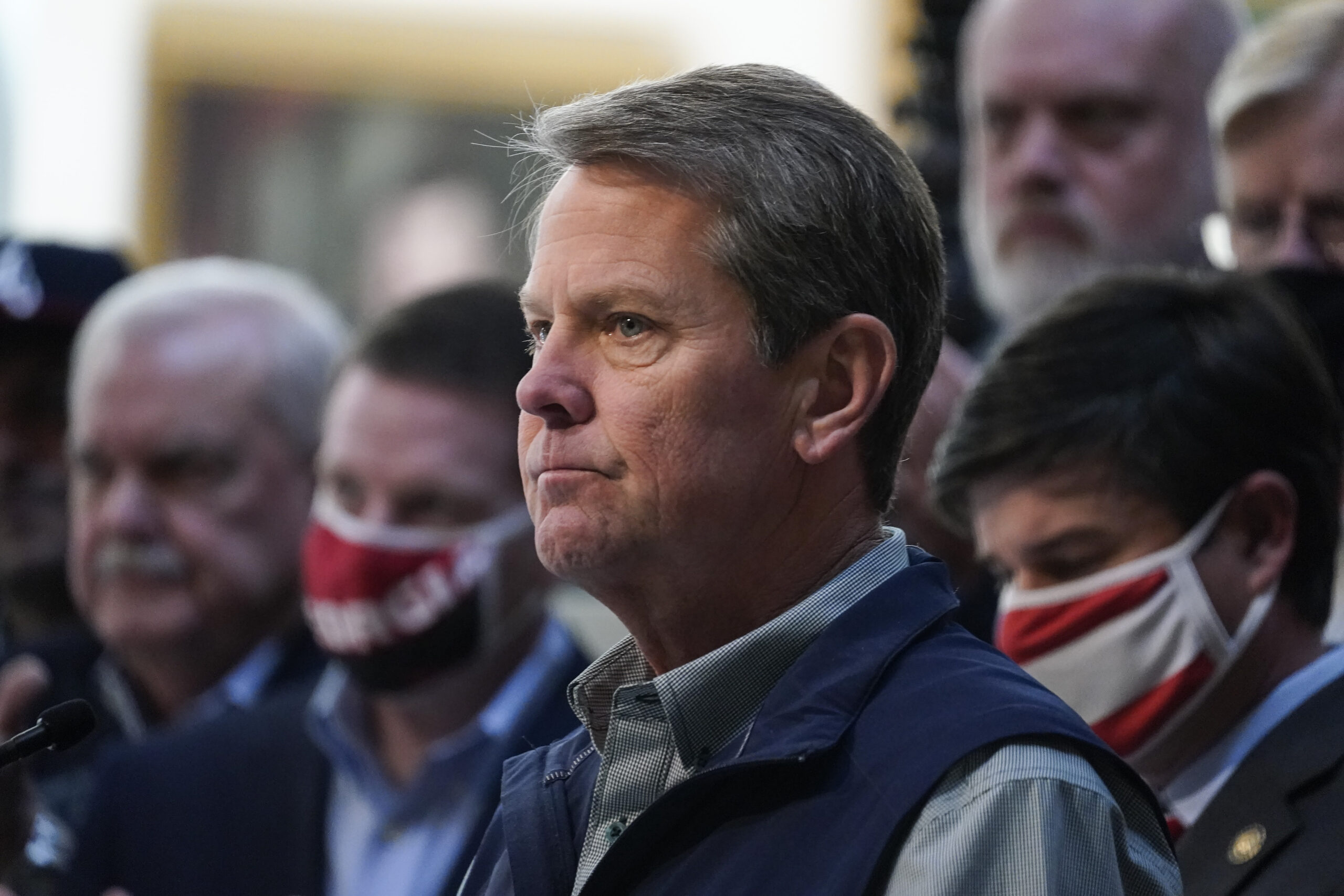Kemp’s Georgia ‘Opening’ Message Causes Confusion Over State’s COVID-19 Rules

In a video statement, Gov. Brian Kemp said that he was “loosening the remaining restrictions on our economy here in Georgia,” which, he said, among other changes, means “distance requirements for bars, restaurants and other places of business will be a thing of the past.” But the 34-page executive order, which went into effect Thursday and expires at the end of April, still includes some distance requirements.
Brynn Anderson / Associated PRess
On Thursday, Gov. Brian Kemp scaled back many of Georgia’s COVID-19 restrictions that had been in place for months. But messaging around the regulatory changes led to confusion about what guidelines actually remain in place.
Dozens of regulations remain on the books.
A press release from the governor’s office late Wednesday titled “Georgia is Open for Business” highlighted the recently signed executive order “rolling back the remaining COVID-19 restrictions on Georgia’s economy.”
In a video statement, Kemp said that he was “loosening the remaining restrictions on our economy here in Georgia,” which, he said, among other changes, means “distance requirements for bars, restaurants and other places of business will be a thing of the past.”
But the 34-page executive order, which went into effect Thursday and expires at the end of April, still includes some distance requirements.
The executive order keeps in place distancing rules for movie theaters (3 feet) and group classes at fitness centers (6 feet). It mandates seats at bars and restaurants be spaced at least 3.5 feet apart.
And while the order does eliminate a number of restrictions that had been in place for months –such as those banning gatherings of a certain size and mandating vulnerable populations to shelter in place –it still includes dozens of rules impacting health care facilities, schools and businesses.
“There was a slight error in the Governor’s recorded video message,” Cody Hall, the governor’s director of communications, said in a statement Thursday.
“Bars and restaurants will still be expected to observe distancing between seated groups, which is typically recommended by public health officials,” he continued.
“Fitness facilities and theatres will also be required to observe minimal distancing between patrons or groups as outlined by the order. The Governor’s order does significantly reduce, or roll back, the remaining restrictions on businesses – including those mentioned above,” Hall said.
Most importantly, he said, “under this executive order, all businesses will be able to resume operations safely.”
Signs of confusion about the state’s COVID-19 rules were apparent Thursday.
The conservative group Tea Party Patriots Action sent out a release applauding Kemp for “lifting all Covid restrictions.” The Democratic Party of Georgia sent out a petition for signatures that claimed “Brian Kemp is rolling back ALL of Georgia’s COVID-19 restrictions.”
Misinformation about the restrictions also spread on social media, like in this Facebook group where members have called for months for Georgia’s COVID-19 rules to be relaxed.
Regardless of whether or not people fully understand the state’s new rules, many public health experts say they’re being scaled back too soon.
“The announcement sends a signal to Georgians that the pandemic is over when it is very much not over,” said Amber Schmidtke, a public health researcher who tracks the pandemic in the state. “I fear the governor’s announcement will encourage Georgians to give up on masks, social distancing, etc., when we can least afford to do so.”
Last week, officials with the Centers for Disease Control and Prevention met with governors around the country to encourage them to press pause on rolling back COVID-19 restrictions as newly confirmed cases have been rising nationwide.
While Georgia’s coronavirus statistics have been steadily improving, Schmidtke says there is still good reason to be cautious as infection rates remain high and Georgia continues to fall behind other states when it comes to vaccinating residents.
“I would just remind people to make good choices because the virus is just looking for the next person to infect. When we get together, we give the virus the opportunity to infect others.”








